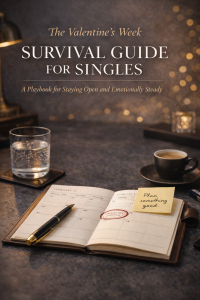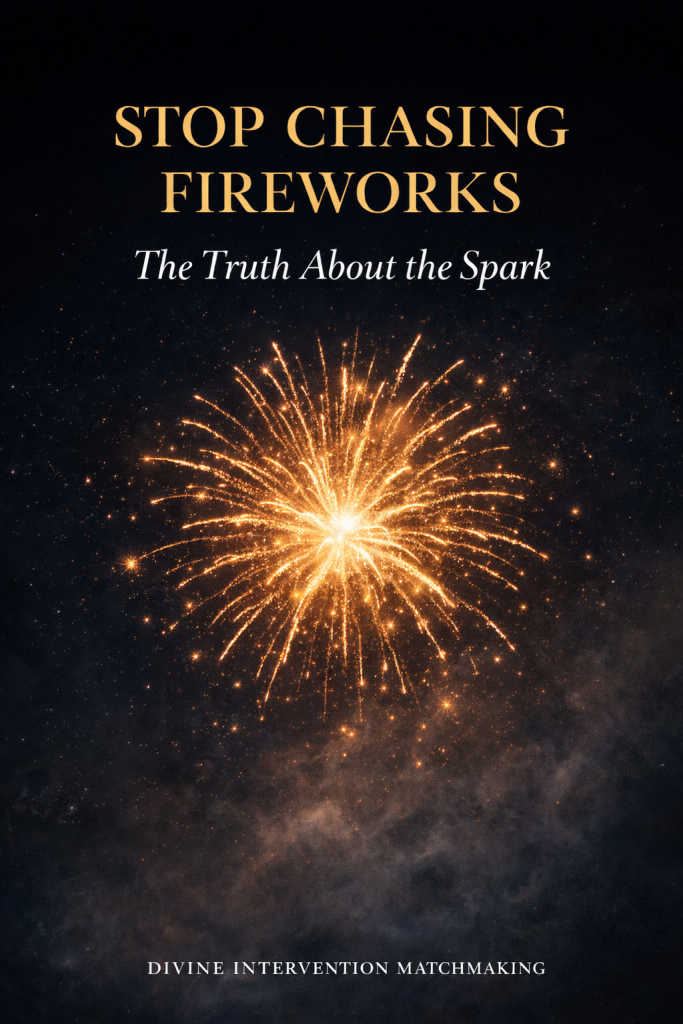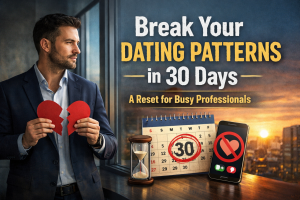The Valentine’s Week Survival Guide for Singles
A Playbook for Staying Open and Emotionally Steady
Written by Diana Cikes
Valentine’s Day isn’t the problem. Valentine’s Week is.
It’s the stretch of time where social feeds get louder, conversations get more loaded, and a perfectly normal Sunday can suddenly feel like an assault on your personal life. Even accomplished, grounded people—who make hard decisions for a living—can find themselves reacting in ways that don’t match their standards.
This isn’t a “treat yourself” article. It’s a playbook for how to move through Valentine’s Week with self-respect, emotional steadiness, and the kind of dating choices you’ll be proud of later.
The goal isn’t to “survive” with distractions. It’s about staying open—and collected.
The real pressure (and why it hits smart people)
Valentine’s Week compresses three things into one:
- Comparison (everyone looks paired-off online)
- Urgency (“Maybe I should just give that person a chance…”)
- Visibility (it’s harder to hide from wanting partnership)
High performers are especially susceptible to a specific trap: treating discomfort like a signal to fix it fast. And in dating, “fast fixes” usually look like:
- entertaining someone you’re not genuinely aligned with
- rushing intimacy to reduce uncertainty,
- or reopening a door you closed for a reason.
If your standards matter for the other 51 weeks of the year, they matter now too.
The Valentine’s Week Protocol: 6 Moves
1) Reduce exposure for 72 hours
You don’t need to “power through” your algorithm.
For three days around Valentine’s, limit the inputs that trigger comparison and distorted thinking:
- Mute the couples content you know will hit you.
- Take social media off your phone for the evening.
- Don’t scroll in bed.
This isn’t avoidance. It’s signal control. You’re protecting your nervous system so you can make decisions from clarity, not from a spike.
Simple rule: If it makes you reactive, it’s not entertainment—it’s interference.
2) Don’t shop emotionally
Valentine’s Week is prime time for “emotional shopping”: panic-swiping, saying yes to a date you don’t want, reviving a lukewarm thread, or entertaining someone because they’re available.
Before you agree to anything this week, run a quick filter:
- Am I curious about this person—or just uncomfortable tonight?
- Would I say yes on a random Tuesday?
- Is this choice moving me toward the relationship I want, or toward temporary relief?
If the answer is relief, it’s not a plan. It’s a reaction.
3) Choose one nourishing plan (not five distractions)
A lot of singles try to “win” Valentine’s Week by staying constantly busy. That can work short-term, but it often leaves you feeling more empty—because distraction doesn’t create fullness, it delays the feeling.
Pick one plan that actually supports you:
- Dinner with a close friend who knows the real you
- Join or plan a singles’ friend group get together.
- Treat yourself to fabulous food from one of your favourite restaurants.
- Have an early night with a book and a great workout the next morning.
- Take a long walk + a call with someone steady.
- Treat yourself to something that will make you feel special – maybe there’s something you’ve been eyeing – and now’s the time to say yes.
- Join a new group that you’re interested in (club, association, etc.).
- Celebrate the love you do have in your life and acknowledge your friends and family who make your life better.
- Do something nice for someone else and make their day. A card, flowers, chocolates, or a bottle of wine lets them know you’re thinking of them and makes them feel special.
Nourishing doesn’t mean dramatic. It means restorative.
4) Set a text policy (especially for exes and “maybes”)
Valentine’s Week can have a strange effect: people reach out.
Sometimes it’s genuine. But more often, it’s loneliness, nostalgia, or convenience.
Your job isn’t to decode their psychology in real time. Your only job is to protect your standards.
Here are two clean scripts you can use:
If an ex texts:
“Thanks for reaching out, however this chapter is closed for me. Wishing you well.”
If a vague ‘maybe’ pops back up:
“Nice to hear from you. I’m dating with purpose. If you’d like to take me on a real date, suggest a time and place.”
If they can’t meet clarity with clarity, you’ve got your answer.
5) Practice “open standards”: warm, direct, and paced
High standards don’t require coldness. But they do require clarity.
This week, your edge is open standards:
- You stay warm.
- You stay direct.
- You don’t audition for anyone.
- You don’t rush intimacy to create certainty.
If you’re dating someone new, let pacing do the work. A relationship worthy of you can tolerate steadiness.
Try this line early in conversation (it’s simple, but it changes the tone fast):
“I’m in a good place in life and looking for something real. I care about how a connection feels—but I also pay attention to consistency and character.”
It signals maturity, and filters out people who want casual access with no accountability.
6) Do one action that supports your actual goal
This is the part most people skip.
If you want a committed relationship, the best antidote to Valentine’s Week anxiety is strategic action—not frantic action.
One meaningful step could be:
- Revisiting non-negotiables (values, lifestyle, kids, timelines)
- Asking a trusted friend to make a real introduction (not “someone to chat with”)
- Upgrading your approach from “hope and effort” to being proactive.
If you’ve been dating through volume and burnout—endless first dates, endless messaging, repeated mismatches—Valentine’s Week is a useful checkpoint:
Do you want more activity, or better outcomes?
Because those aren’t the same.
A quick reality check: three questions that keep you honest
If you feel the Valentine’s Week squeeze, answer these questions:
- What kind of relationship am I looking for?
- What am I no longer willing to tolerate?
- What would a good match look like this week?
The point isn’t to be perfect. It’s about alignment and mutual fit.
Closing thought: this week doesn’t get to define you
Valentine’s is a commercial occasion. Not a deadline.
The people who end up in truly strong relationships aren’t the ones who panic when the calendar gets loud. They’re the ones who stay clear, stay warm, and keep making high-quality choices—even on the hard weeks.
If you want fewer dates and quality, vetted introductions
Divine Matchmaking is for accomplished singles who don’t want volume—they want curated introductions with relationship-ready people, handled discreetly and intentionally.
👉 Book a private confidential consultation if you’d like support applying these standards or are ready for curated introductions.



 And then… you’re checking your phone too often. Replaying every moment. Wondering if you said the wrong thing. Feeling oddly “on,” slightly on edge—yet telling yourself, this must be chemistry.
And then… you’re checking your phone too often. Replaying every moment. Wondering if you said the wrong thing. Feeling oddly “on,” slightly on edge—yet telling yourself, this must be chemistry. the benefit of the doubt—and maybe stayed longer than you should have because you saw potential.
the benefit of the doubt—and maybe stayed longer than you should have because you saw potential.
